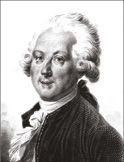55. Louis-Sébastien Mercier (1740-1814), Portrait of Paris, 178187

Louis-Sébastien Mercier, playwright, novelist, and a great chronicler of his era, offers reflections on the customs of his contemporaries in Tableau de Paris.88
Religious freedom is entirely possible in Paris; never will you be held accountable for your beliefs. […] A bishop was once asked: ‘What are you complaining about? Have you ever seen a single act of sacrilege? Has a single philosopher ever disrupted even one catechism class? Have those who preach from the pulpit ever encountered a single heckler? They have always enjoyed the most gratifying right of all – that of never being interrupted or contradicted whatever they say’. And the bishop replied: ‘If only God would permit the occasional sacrilege! At least then people would still be thinking about us, but now they can’t even be bothered to show any disrespect’. […]
Jews, Protestants, deists, atheists, Jansenists, equally culpable in the eyes of the Molinists, even nothingists, therefore, live just as they please; people don’t even argue about religion anymore. It is an old trial, with a definitive ruling; and about time too, given that the enquiry has lasted centuries. […] The Enlightenment has brought us this desirable calm, and fanaticism has been left to consume itself. We only hear talk of Jansenism and Molinism in a few insignificant households, where folly and hypocrisy reign supreme; and from a few women who, because they are unable to partake of earthly pleasures, take up these ancient arguments with the pillars of the parish, spiritual directors born of the common rabble, and almost indistinguishable from it.
Read the free original text online (facsimile), 1781 edition: https://books.google.co.uk/books?id=J0kGAAAAQAAJ&pg=PA367
87 Louis-Sébastien Mercier, ‘à Hambourg et à Neuchâtel’, Tableau de Paris, 1781, III, ch. 231, p. 367.
88 Eighteenth-century portrait of Mercier: https://commons.wikimedia.org/wiki/File:Louis-SebastienMercier.jpg







